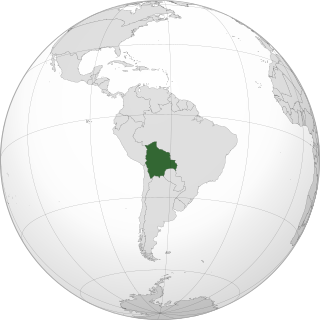The Nationalist Union of the People (Spanish: Unión Nacionalista del Pueblo, UNP) was a right-wing, pro-military electoral political alliance in Bolivia.

Spanish or Castilian is a Romance language that originated in the Castile region of Spain and today has hundreds of millions of native speakers in the Americas and Spain. It is a global language and the world's second-most spoken native language, after Mandarin Chinese.
A political alliance, also referred to as a political coalition, political bloc, is an agreement for cooperation among different political parties on common political agenda, often for purposes of contesting an election to mutually benefit by collectively clearing election thresholds, or otherwise benefiting from characteristics of the electoral system or for government formation after elections. These may break up quickly, or hold together for decades becoming the de-facto norm, operating almost as a single unit.

Bolivia, officially the Plurinational State of Bolivia is a landlocked country located in western-central South America. The capital is Sucre while the seat of government and financial center is located in La Paz. The largest city and principal industrial center is Santa Cruz de la Sierra, located on the Llanos Orientales a mostly flat region in the east of Bolivia.
The UNP was formed in January 1978 by:
- Bolivian Socialist Falange, FSB (right-wing pro-military faction led by Gastón Moreira Ostria)
- Nationalist Revolutionary Movement, MNR (pro-military faction led by Rubén Julio Castro)
- Authentic Revolutionary Party, PRA (pro-military faction led by Jorge Ríos Gamarra)
- Committee of National Unity, CUN
- Popular Christian Movement, MPC
- Liberal Party, PL
- Barrientista National Union, UNB
- Republican Socialist Unity Party, PURS
- Social Christian Party, PSC. [1]

The Bolivian Socialist Falange is a Bolivian political party established in 1937. Despite its leftist-sounding name, it was a far-right party drawing inspiration from fascism. It was the country's second-largest party between approximately 1954 and 1974. After that, its followers have tended to gravitate toward the government endorsed military candidacy of General Juan Pereda (1978) and, especially, toward the ADN party of former dictator Hugo Banzer. Its current status is unclear.
The Committee of National Unity was a right-wing self-styled "technocratic" organization of moderate conservative business and government leaders in Bolivia.
The Popular Christian Movement was a political party in Bolivia, de facto controlled by the military junta.
It presented as its presidential candidate Juan Pereda Asbún (independent) and Alfredo Franco Guachalla (MNR), as vice-presidential candidate. [2]
Juan Pereda Asbún was a former military general and dictator of Bolivia (1978). Although he ruled for only four months, his ascent to the presidency marked the beginning of the most unstable period in Bolivian history, with nine presidents in a little over 4 years (1978–1982), in comparison to only one in the previous seven.

